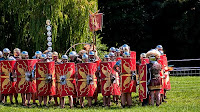The Trojan War formed the mythological background for Roman culture.
Roman culture is everywhere.
ITALY
Sicily was primarily Greek controlled.
Everything up to about the ankle was also Greek
Bay of Naples: near the remains of Pompeii.
Variety of geography and people in Italy.
IULUS-
Alba Longa
Story of Rome
Romulus and Remiss- raised by she wolves
They grow up and they have a lot of sibling rivalry
Declare war. Romulus wins and kills Remiss
Plebeians and Patricians
The struggle of the orders
They fixed it by having one Plebian have the power to veto the laws the Patricians make.
First city in the world to have more than a million people
Pyrrhus of Epirus-
Greek king that decided he was going to take on the Romans. Invades Rome Won most of the battles but lost so many people they were unable to go on and was not able to full of the final victory. This is called the Pyrrhic victory. Rome is then able to then fend off a major opponent
Punic War
3 panic wars
Define Roman dominance in the Mediterranean
264-146 BCE
Etruria
Tarquin, the Proud
Traquin, the Sixth- raped Lucretia- the wife of the Proud.
Lucius Junius Brutus, helps start the Roman Republic
Roman Republic was founded in 509 BCE
1. Aeneas/ Trojans defeat Latium
2. Alba Longa
3. Romulus and Remus/ Founding on Rome in 753 BCE
4. Expulsion of the Etruscan Kings/ Establishment of the Roman Republic 6th century.
5. The struggle of the Orders/ Tribune of the Plebs
6. Roman expansion/ Pyrrhus
7. 1st Punic War
PUNIC WAR
1st- War that basically puts Rome on the map.
2nd- Hamlicar- father of Hannibal.
HANNIBAL
· Used war elephants to cross the mountains of Spain
· Invaded Rome.
· 60 thousand of Romans died in the battlefield.
· He didn't want to control Rome, he wanted to destroy and defeat Rome. Got within fifty miles of the city, but doesn't have the supplies or invasion force left to fully siege the city. Can't get final victory.
· The Roman general who beat Hannibal was Scipio. Known as Scipio Africanus. The last battle of the Punic War. Battle of Zama.
BATTLE OF ZAMA.
Decisive battle of the second Punic war.
Carthaginians attack
Send elephants
Romans blow the horns freaking elephants out making them turn around and retreat. Then it is infantry against infantry.











.jpg)




